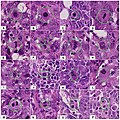Breast cancer classification
Breast cancer classification' involves categorizing breast cancers based on different factors, including the cancer's morphology, genetic makeup, and response to therapy. This classification aids in determining the prognosis and the most effective treatment strategies for patients. Breast cancer is a heterogeneous disease, meaning it has many subtypes that require different management approaches.
Types of Breast Cancer Classification
By Histopathology
Breast cancer can be classified based on its histological appearance, which is observed under a microscope after a biopsy or surgery. The main types include:
- Ductal Carcinoma In Situ (DCIS): A non-invasive cancer where abnormal cells are found in the lining of a breast duct.
- Invasive Ductal Carcinoma (IDC): The most common type of breast cancer, starting in the milk ducts and invading surrounding tissues.
- Invasive Lobular Carcinoma (ILC): Cancer that begins in the lobules (milk-producing glands) and spreads to surrounding tissues.
- Inflammatory Breast Cancer (IBC): A rare and aggressive form of breast cancer that causes swelling and redness in the breast.
By Receptor Status
Breast cancers are also classified based on the presence or absence of three receptors known to fuel most breast cancer growth:
- Estrogen Receptor-positive (ER+): Cancers that have receptors for estrogen.
- Progesterone Receptor-positive (PR+): Cancers that have receptors for progesterone.
- HER2-positive: Cancers that have an excess of the HER2 protein on their surface.
Cancers lacking these receptors are termed Triple-negative breast cancer (TNBC), which tend to be more aggressive and have fewer treatment options.
By Genetic Profile
Advancements in genomic testing have led to the classification of breast cancer based on its genetic makeup. The most well-known test, Oncotype DX, helps predict a patient's risk of cancer recurrence and whether they will benefit from chemotherapy. Breast cancers can also be classified into subtypes based on gene expression profiles, such as Luminal A, Luminal B, HER2-enriched, and Basal-like.
Staging
Breast cancer staging is crucial for determining the extent of the disease and guiding treatment decisions. The TNM system, which stands for Tumor size, Node involvement, and Metastasis, is commonly used. Stages range from 0 (non-invasive) to IV (metastatic cancer).
Treatment Implications
The classification of breast cancer significantly influences treatment choices. Hormone receptor-positive cancers may be treated with hormone therapy, while HER2-positive cancers can be targeted with HER2 inhibitors. Triple-negative breast cancers, lacking targeted therapies, are usually treated with chemotherapy.
Prognosis
The prognosis of breast cancer varies widely depending on its classification. Generally, early-stage, hormone receptor-positive cancers have a better prognosis than advanced, triple-negative or HER2-positive cancers.
Future Directions
Research is ongoing to refine breast cancer classification and discover new biomarkers that can guide treatment. Personalized medicine, which tailors treatment to the individual characteristics of each patient's cancer, is the ultimate goal.
Transform your life with W8MD's budget GLP-1 injections from $125.
W8MD offers a medical weight loss program to lose weight in Philadelphia. Our physician-supervised medical weight loss provides:
- Most insurances accepted or discounted self-pay rates. We will obtain insurance prior authorizations if needed.
- Generic GLP1 weight loss injections from $125 for the starting dose.
- Also offer prescription weight loss medications including Phentermine, Qsymia, Diethylpropion, Contrave etc.
NYC weight loss doctor appointments
Start your NYC weight loss journey today at our NYC medical weight loss and Philadelphia medical weight loss clinics.
- Call 718-946-5500 to lose weight in NYC or for medical weight loss in Philadelphia 215-676-2334.
- Tags:NYC medical weight loss, Philadelphia lose weight Zepbound NYC, Budget GLP1 weight loss injections, Wegovy Philadelphia, Wegovy NYC, Philadelphia medical weight loss, Brookly weight loss and Wegovy NYC
|
WikiMD's Wellness Encyclopedia |
| Let Food Be Thy Medicine Medicine Thy Food - Hippocrates |
Medical Disclaimer: WikiMD is not a substitute for professional medical advice. The information on WikiMD is provided as an information resource only, may be incorrect, outdated or misleading, and is not to be used or relied on for any diagnostic or treatment purposes. Please consult your health care provider before making any healthcare decisions or for guidance about a specific medical condition. WikiMD expressly disclaims responsibility, and shall have no liability, for any damages, loss, injury, or liability whatsoever suffered as a result of your reliance on the information contained in this site. By visiting this site you agree to the foregoing terms and conditions, which may from time to time be changed or supplemented by WikiMD. If you do not agree to the foregoing terms and conditions, you should not enter or use this site. See full disclaimer.
Credits:Most images are courtesy of Wikimedia commons, and templates, categories Wikipedia, licensed under CC BY SA or similar.
Contributors: Prab R. Tumpati, MD








